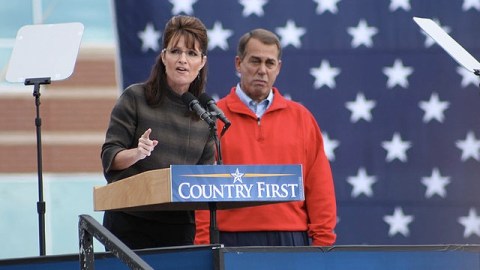The Republicans’ Worthless Pledge to America

Tomorrow, the Republicans plan to roll out their “Pledge to America” outlining what they plan to do if they regain control of Congress. The platform is an updated version of the “Contract with America” the Republicans produced before their landslide victory in the 1994 midterm elections. The document, which is already available online, will allow the Republicans to shed their image as “the Party of No” and claim they have a positive plan for governing. And it may be just what they need to position themselves for a repeat of the 1994 landslide. But as a plan for fixing the economy it’s almost completely worthless.
The plan has been ridiculed by across the political spectrum. Red State blogger Erick Erickson calls it “ridiculous,” saying it’s full of “mom tested, kid approved pablum.” Andrew Sullivan calls it “a joke” and “the most fiscally irresponsible document ever offered by the GOP.” Ezra Klein says that “It is a document with a clear theory of what’s gone wrong—debt, policy uncertainty, and too much government—and a solid promise to make most of it worse.”
I have argued before that the Republican economic plan was little more than a return to the policies in place under Bush when the economic crisis started. Obama’s stimulus package hasn’t fixed our economic problems, but it didn’t cause them either. And at least Obama had a plan for fixing them. The Republican plan for stimulating the economy consists primarily of repealing taxes that haven’t gone into effect yet and ending stimulus programs which are expiring anyway. In other words, doing essentially nothing.
The more fundamental problem is that the plan is predicated on the idea that we have to reduce the size of government, be fiscally more responsible, and reduce uncertainty for businesses. I don’t believe that it’s smart to cut public spending when consumer spending is so weak, but at least that’s something reasonable economists can differ on. But the Republican plan doesn’t actually do any of the things it says. The Republican plan to reduce the size of government consists of cancelling the few remaining stimulus programs, ending the Troubled Asset Relief Program—a program which may actually make a profit—and eliminating waste. There’s not a lot of savings to be had there. Off the table completely are all the programs that actually cost us real money—social security, medicare, and military expenditures. As Sullivan says, when politicians say “they are going to ‘eliminate wasteful and duplicative programs,’ you know they are bullshitting you on fiscal responsibility.”
Meanwhile, the Republicans plan to extend all the Bush tax cuts—tax cuts which they originally set to expire now in order to get around rules designed to balance the budget—costing the government trillions of dollars over the next ten years. They also plan to repeal what they call what they call the “costly health care reform law,” a move that’s actually projected to increase the deficit by billions more dollars. As Klein says, nothing in their plan comes close to paying for these two proposals. And their plan to eliminate uncertainty over government regulations consists of reviewing and changing the regulations again, thereby creating even more uncertainty.
Klein sums up the Republican plan’s contradictions well when he writes that
The document speaks constantly and eloquently of the dangers of debt—but offers a raft of proposals that would sharply increase it. It says, in one paragraph, that the Republican Party will commit itself to ‘greater liberty’ and then, in the next, that it will protect ‘traditional marriage.’ It says that ‘small business must have certainty that the rules won’t change every few months’ and then promises to change all the rules that the Obama administration has passed in recent months.
In the end, the net effect of the Republican plan will be to increase the deficit by cutting taxes for people earning more than $250,000 a year while doing essentially nothing to reduce the amount the government spends. If you think that’s going to get the economy going again, you should vote Republican.





